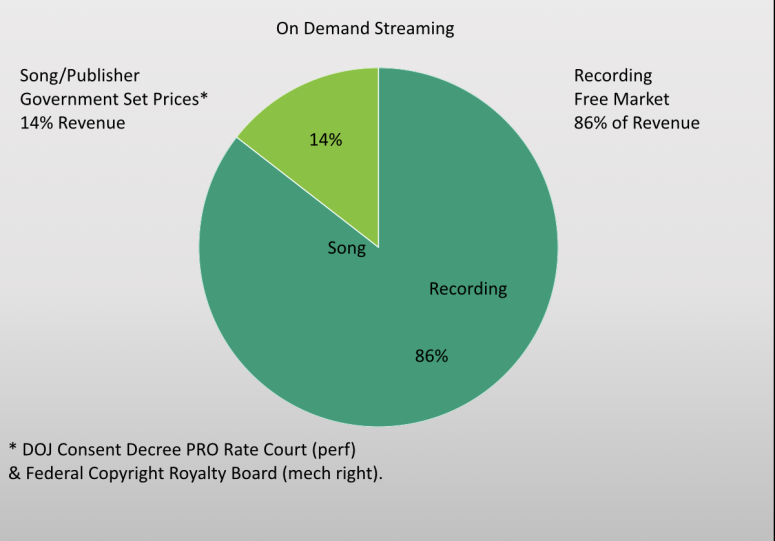First I bet you didn’t know that US Government sets the prices for many uses of songs and recordings? What? Are you telling me that in 2015 there is not a technologically feasible way to let the free market set the price of songs and recordings for broadcast, webcasting and streaming? Bat-shit crazy ain’t it?
Well if you consider that some of the largest most politically powerful corporations benefit from this process it makes a little more sense. I’ll name just two: Clear Channel and Google. Pay to play government at its finest.
Before you accuse me of pie-ism (arguing over who gets how much songwriters or performers get of the paltry and shrinking pie) I am not. I’m simply pointing out how irrational it is to have the government setting prices in this day and age. It is not even clear that the process is constitutional as much of the price setting process has no statutory basis, simply just a “temporary” DOJ consent decree that dates from 1941!!! How are my rights limited by something that is neither a law passed by Congress nor something to which I agreed? Remember I wasn’t even born yet in 1941. Neither were the vast majority of songwriters working today. This is the craziest thing ever.
The first chart represents the revenue generated by my songs and recordings from commercial, TV and film licensing deals 2009-2014. 35 deals. Notice the free market values the song and recording almost equally. I’ve polled a couple mid-size indie publishers and they report approximately the same ratio (based on MFN deals).
The second chart shows what happens for streaming, when the rights to the recording is negotiated in the free market but the songwriter rates are set by the government. These ratios are the same for virtually every songwriter/performer and don’t apply to just my catalogue.
How does the market value songs compared to recordings?
What happens when the government interferes with pricing for songs?
This third chart takes a little effort to explain. This chart shows what happens for non-interactive streaming (Pandora/Sirius/IHeartRadio etc) when the rates are set by two totally different government processes. The rates for my BMI registered songs are set by a single appointed for life federal judge. The rates for the recordings are set by the Copyright Royalty Board in Washington DC. The CRB must take in to account “free market” pricing. But make no mistake it’s government set pricing. And it’s totally arbitrary and subject to manipulation.
What happens when the government uses two different processes to set prices. One for songs and a different one for recordings.




Could this be any more compelling?
No. It couldn’t be.
Every Member of Congress and key staff should read this article. Help spread the word.
This is really poorly worded and explained.
I am quite an expert at this kind of stuff. For many years, more than 50% of my revenue comes from licensing.
But I had to read, and reread your words and I still don’t completely understand what you were saying.
Can you explain how the government sets the prices? I see lots of exclamation points, very little sources. The only link on the post is to a post about Bernie Madoff?
Honestly, I’m not trying to argue here, I might agree with everything you are trying to say. But I can’t tell what your argument is by reading it.
Can you have someone edit this, and repost it more clearly? Especially after ASCAP linked to it on an e-mail today?
You are an expert at Music Licensing? And you have never heard of the Copyright Royalty Board which sets mechanical and webcasting and streaming rates? You’ve never heard of the BMI and ASCAP rate courts? which set the performance fees? No wonder you are staying at The Oakwood:) http://iplocation.truevue.org/76.91.195.233.html
You might want to check with your manager and make sure you’re getting all your money.